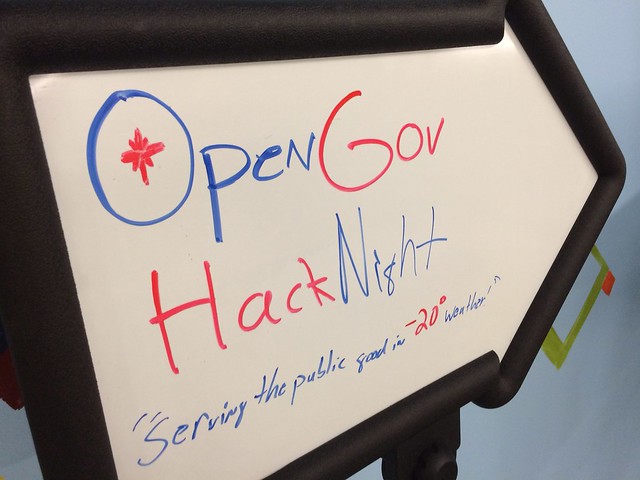Editor’s Note: Today, Smart Chicago Consultant and Brigade Regional Coordinator Christopher Whitaker will be giving a training on how to level up your civic hacking event. Christopher is one of the co-hosts of the nationally renowned Chicago OpenGov Hack Night as well as running a number of events for Smart Chicago including Chicago’s National Day of Civic Hacking. We’ve put his slides and training notes below the fold.

Welcome to the training – in this session we’re going to go over ways you can improve your hackathons and hack nights. Whether it’s a hackathon or a weekly hack night/brigade meeting the first thing you want to ask is why are you hosting your event?
We’ll start with hackathons. Code for America and the national civic innovation movement tend to have at least two major hackathons a year. The first is CodeAcross which is led by Code for America around February of each year. The second is National Day of Civic Hacking which usually falls around the end of May.
There are some common critiques of hackathons that result from a misunderstanding on what civic hackathons are good for.
Hackathons are a tool for community organizing or organizing around a specific problem set.
Hackathons are not useful for:
- Building fully finished apps: The “Oh, let’s have a hackathon to build an app to solve all our problems!” type of hackathon generally flops because a weekend isn’t enough time to build a finished fully capable product.
- Getting people to use YOUR product: The “Oh, let’s have a hackathon and get people to use our platform to get more customers!” generally isn’t a good idea. Even with a prize for the best use of your tool, you aren’t really hosting a civic hackathon. You’re hosting a marketing event. Not that there’s anything wrong with that, but when you do this you are missing the point of hosting the civic hackathon in the first place. (Which should be spur civic innovation to solve social problems.)
- Building a very specific app that meets your very specific needs: The “We really want this, let’s order a bunch of pizza, hold a hackathon and have them do something!” is counter-productive. If you have a scope of work and know what you want, just hire somebody.
On the other hand, civic hackathons are useful if you want to:
- Organize people around specific problem set and brainstorming ideas: “We want to make our city sustainable. Let’s get the environmental affairs people together with the technologists ” type of hackathon. If you have a particular problem and a particular set of resources you can throw at it, a hackathon can help brainstorm ideas about how to address the problem. Keep in mind, this hackathon only works if you have subject matter experts *and* the technologists talking together.
- Organize to recruit people into the civic innovation community: The “there are not enough women/non-profits/journalists at our hack nights” type of hackathon. Hackathons can be great recruiting tools to get more people into your community. Granted, these types of hackathons are built for beginners and have more of a training element to them.
- Test out a new civic dataset or API: The “Ok, we finally got this dataset out.. now what can we do with it” type of hackathon. Fair warning: the data in it of itself won’t be enough. You’ll need to have subject matter experts on hand to help explain what the data is actually showing. For example, if you’ve released a new food inspection data set you should have somebody from the health department on hand to explain the details. (People are not good guessers). These types of events are good for seeing the types of projects that can be done with your new data set or API.
We want to start off planning for the hackathon by asking “what is it you want to accomplish?” That also leads us to a major point in having a successful hackathon.
Having a plan to carry on the work after the event
While civic hackathons are a great organizing tool, they don’t always result in fully finished and tested civic apps. For that, other efforts need to be made to carry the work forward.
Spoiler alert: Hack nights and brigade meetups are great ways to carry the work forward.
(If you want to learn more about hackathons – we have a post on that here.)
Set yourself up for success
Regardless of if you’re running a hackathon or a hack night – there’s a few things you can do to set yourself up for success.
When thinking about possible app projects start with the problem
There’s always the temptation when a great new data set comes out to go… OOOOH SHINY and immedietly start hacking on it just because you have data now.
Don’t do that.
You should always start with problem sets. Specifically, you should be talking to problem owners (non-profit employees, front line government workers, residents, activists) to understand the exact challenges. Then, go after the data sets. Starting with the problem lets you wireframe out projects and design something that’s much more useful. If you’re running a hackathon, have the problem owners speak and be available throughout the event. And if you’re running a hack night, recruit those people to hack night. Ideally, they’ll be part of the team!
Provide Resources
To be perfectly honest, this work is difficult. And not just for those who are coming at it from the non-coding side of the house. To understand government issues is a challenge. To understand how to do tech well is a challenge. To understand how to do both as volunteers has a pretty big learning curve and it does take effort.
By providing resources (how-to guides, technical expertise, pre-reading, research, links to github, lnks to examples), you’ll help to provide on-ramps and make the learning curve not quite so scary.
Recruit Recruit Recruit
So, you have the time, place, food, speakers, and you’ve made sure the wifi works. All done right? No. One of the biggest task you need to do is recruit to your event. Ideas for doing that are social media, meetup groups (such as programming language user groups and women in coding groups), colleges, non-profits, and local startup incubators.
Communicate Communicate Communicate
Nobody is going to tell your story for you. Before, during and after your event you should be tweeting, blogging, and/or live streaming and talking about what you’re working on, the challenges you’re facing, the wins you’ve had, and the things that were presented. The more people that realize you’re doing awesome and impactful work the more people will show up wanting to be involved.
Having a good hack night
Here are some tips to having a good hack night.
Consistency – Same time, same place, same agenda
Having your event at the same time and place means that if somebody can’t make one meeting – they know that they’ll be another meeting next week. Having the same agenda not only makes it easier to manage, but it gives people an idea of what to expect. The agenda of OpenGov Hack Night has been pretty consistent for the last three years: Introductions, Announcements, Presentations, Breakout for the hacking.
Introductions are awesome – even if they take awhile
Even though they take awhile, introductions are an invaluable part of any civic hacking event. If you did the recruiting correctly, then you’re going to have a diverse group of people who may not have had the chance to meet each other. Particularly, groups of people in non-profit/government and technology. This cross-pollonation of these groups is one of the best features about hack nights. Introductions are always well worth the time.
Explain! Explain! Explain!
The work that we do is not magic. Both the government and the technical side of what we do can be learned and it can be taught. At it’s best, the work that we do including the apps we create should be designed to be easily re-creatable. If somebody walks away from a presentation and think “it’s magic” then something has gone wrong. There’s no such thing as magic. (With our sincerest apologies to JK Rowling)
Anytime we say anything that’s jargony (on both the gov, non-profit, and tech sides) we should always explain the jargon.
Encourage Questions

Again, this stuff is hard. There is a learning curve. People at some point should be asking questions – particularly when trying to figure out how to do something or how technology/social service program works. It can get complicated!
A neat trick to doing this (also known as the Juan Pablo-Valez method) is to have the organizer ask questions from other organizers about anything jargony – even though it’s clear that the organizer knows the answer. For example, “What’s an API?” and “what’s HIPPA?”
This sends a clear signal that it’s OK to ask questions. If you have a presentation that is somewhat long or that you know that you’re going to cover something complicated – you can also plan out a ‘Does anyone have any questions so far” moment. (For example, I do this during the Civic Hacking 101 orientation after explaining data portals and GitHub.)
Have Breakouts
If you’re running a hack night, a good way to organize the time after presentation is to breakout into groups by subject area. This way, you get all the people who are really interested in transpotation/education/social services/health all in the same group and talking to one another. You should leave these flexible so that people can make up their own breakout group if they’re not interested in any of the ones you’ve provided.
The other thing you should do is to have an orientation session to answer basic questions and to get people oriented. (And lower the learning curve.) Here’s an example of one that I run for Chicago.
Tell your story!
After your hackathon or hack night, you should try and write a blog post about your event. This lets you record what you talked about for later reference. It also helps drive people to your future events because they’ll be reading about how awesome your event was. It can also help foster discussion about the issues you’re working on. Blogging is not as easy as it sounds, and so we’ve also put together a post to help with that.
Live tweeting your event is also a great way to generate discussion.
A note about smack talk.
Now, like any good sports fan I like talking smack. One would think that talking smack against other cities would be a bad thing – but in fact people pay attention to smack talk and can be a way to get people to tune into what you’re doing. Since brigade hack nights tend to fall on the same days, a little friendly banter between cities can be useful to help trigger engagement.
It can also lead to Miami Brigade Co-Captain Ernie Hsiung winning the internet.
If you have more questions
If you have more questions feel free to reach out to us!






